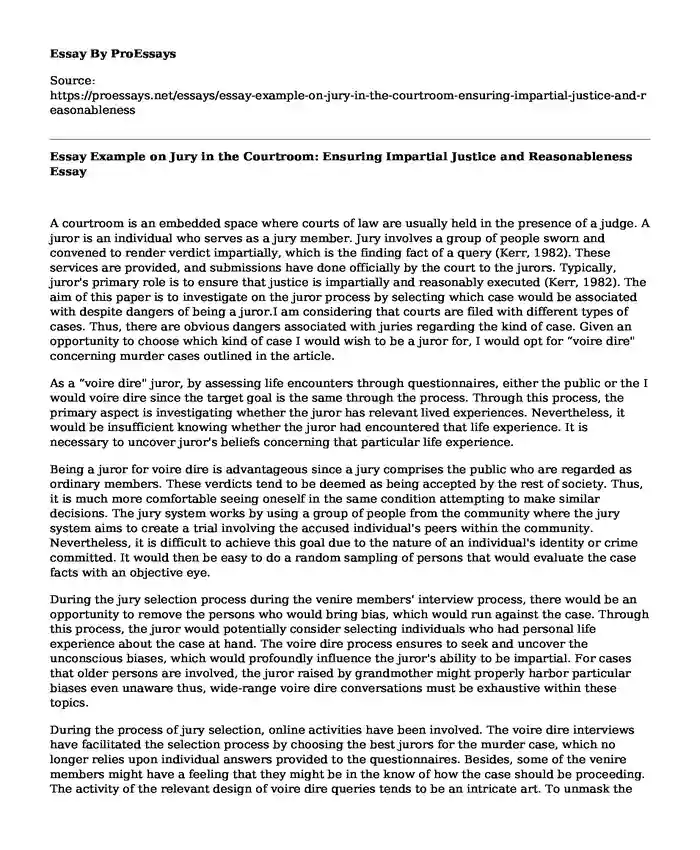A courtroom is an embedded space where courts of law are usually held in the presence of a judge. A juror is an individual who serves as a jury member. Jury involves a group of people sworn and convened to render verdict impartially, which is the finding fact of a query (Kerr, 1982). These services are provided, and submissions have done officially by the court to the jurors. Typically, juror's primary role is to ensure that justice is impartially and reasonably executed (Kerr, 1982). The aim of this paper is to investigate on the juror process by selecting which case would be associated with despite dangers of being a juror.I am considering that courts are filed with different types of cases. Thus, there are obvious dangers associated with juries regarding the kind of case. Given an opportunity to choose which kind of case I would wish to be a juror for, I would opt for “voire dire" concerning murder cases outlined in the article.
As a “voire dire" juror, by assessing life encounters through questionnaires, either the public or the I would voire dire since the target goal is the same through the process. Through this process, the primary aspect is investigating whether the juror has relevant lived experiences. Nevertheless, it would be insufficient knowing whether the juror had encountered that life experience. It is necessary to uncover juror's beliefs concerning that particular life experience.
Being a juror for voire dire is advantageous since a jury comprises the public who are regarded as ordinary members. These verdicts tend to be deemed as being accepted by the rest of society. Thus, it is much more comfortable seeing oneself in the same condition attempting to make similar decisions. The jury system works by using a group of people from the community where the jury system aims to create a trial involving the accused individual's peers within the community. Nevertheless, it is difficult to achieve this goal due to the nature of an individual's identity or crime committed. It would then be easy to do a random sampling of persons that would evaluate the case facts with an objective eye.
During the jury selection process during the venire members' interview process, there would be an opportunity to remove the persons who would bring bias, which would run against the case. Through this process, the juror would potentially consider selecting individuals who had personal life experience about the case at hand. The voire dire process ensures to seek and uncover the unconscious biases, which would profoundly influence the juror's ability to be impartial. For cases that older persons are involved, the juror raised by grandmother might properly harbor particular biases even unaware thus, wide-range voire dire conversations must be exhaustive within these topics.
During the process of jury selection, online activities have been involved. The voire dire interviews have facilitated the selection process by choosing the best jurors for the murder case, which no longer relies upon individual answers provided to the questionnaires. Besides, some of the venire members might have a feeling that they might be in the know of how the case should be proceeding. The activity of the relevant design of voire dire queries tends to be an intricate art. To unmask the attitudes and potential biases that the juror might not be in a position to note they are held. Framing of questions should be in the form of an open-ended to facilitate the spelling out of response that the juror is searching for. Through the process, a sense of feeling comfortable with the jury's potential juror to establish a moment where would feel free and confident with no fear outlining their thoughts and experiences. Constant monitoring of non-verbal cues should be incorporated.
It is not usual to encounter jurors who tend to believe solely that they have the capability of being unbiased. Nevertheless, those who can maintain the main focus of view inhibits them from being in a position to view the case impartially. Personal biases might be due to findings from various factors. Significantly, jurors learn about the case through the cause trial to minimize chances where the feeling of already knowing what happened.
Conclusion
In conclusion, it is crucial to seat jurors who tend to be courageous with individual convictions. Thus the main reason for the selection process is to get rid of jurors who seem to be unduly with concerns that they might be judged by both the judge and as well be criticized by the public. Thus social pressure. To be a competent, impartial juror, one has to be fearless to what others would judge him/her about the case and as well avoid being so much excessively being socially overbearing. Despite all dangers associated with jury processes, the courtroom sets guidelines to ensure that all jurors are protected from being intimidated or harassed. One method of this is by providing the juror remains anonymous all through the case since the defendants can seem to threaten jurors if their identity is known.
Work Cited
Kerr, N. L., & Bray, R. M. (Eds.). (1982). The psychology of the courtroom. New York: Academic Press.
Cite this page
Essay Example on Jury in the Courtroom: Ensuring Impartial Justice and Reasonableness. (2023, Oct 02). Retrieved from https://proessays.net/essays/essay-example-on-jury-in-the-courtroom-ensuring-impartial-justice-and-reasonableness
If you are the original author of this essay and no longer wish to have it published on the ProEssays website, please click below to request its removal:
- Racial Disparity in Incarceration
- Sociology Essay on the Immigration Problem in the United States
- Is Serial Killing an Addiction? Essay Example
- Does Technology Invade Our Privacy? Paper Example
- Essay on Leadership in Criminal Justice: Attracting Subordinates and Improving Performance
- Research Paper on Ethical and Legal Issues in Nursing
- Essay on Police Searches & Seizures: The Balance Between Civil Liberties & Society







